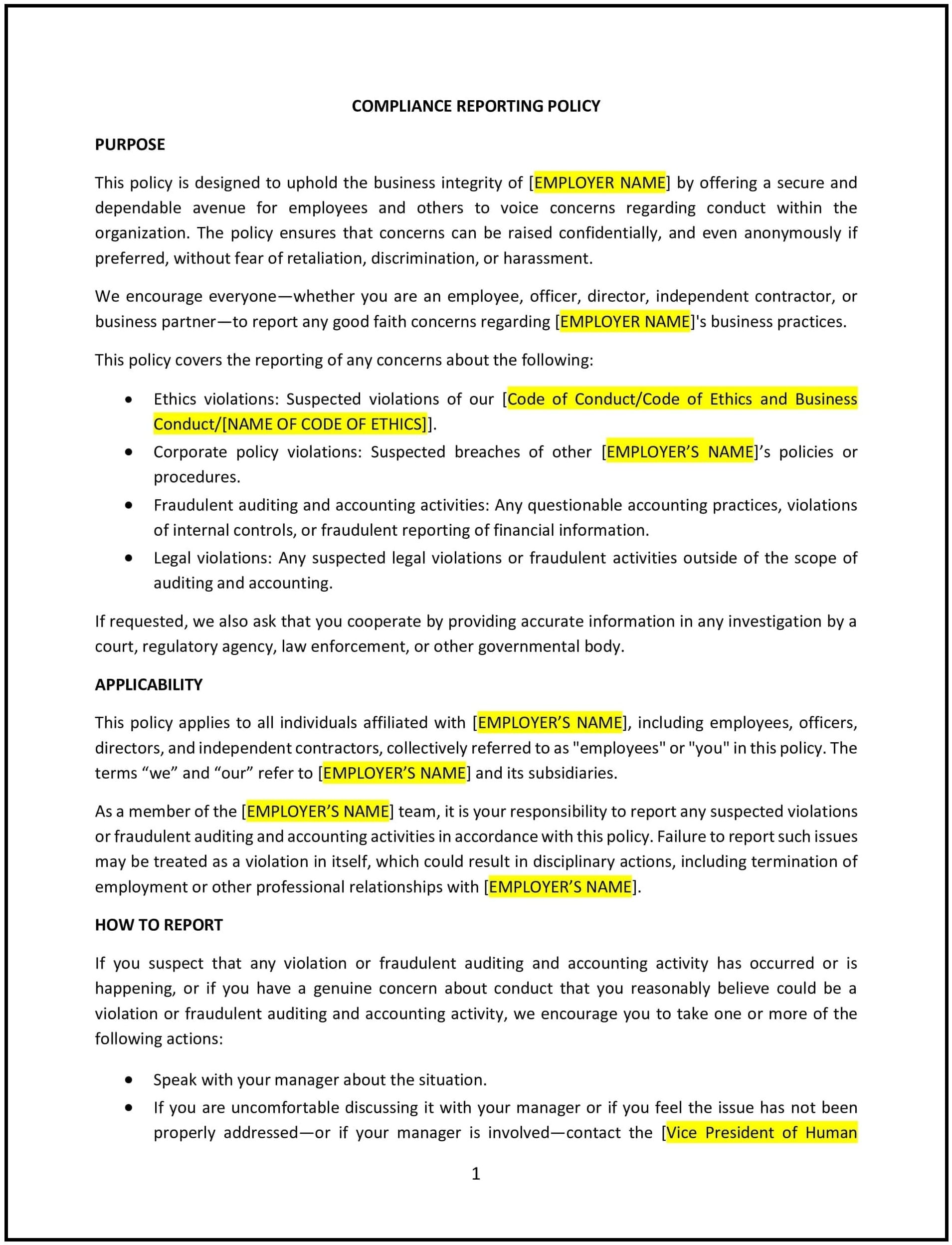Compliance reporting policy (Washington): Free template
Got contracts to review? While you're here for policies, let Cobrief make contract review effortless—start your free review now.

Customize this template for free
This compliance reporting policy is designed to help Washington businesses establish a process for employees to report concerns related to compliance with laws, regulations, and company policies. The policy outlines how employees can report violations or concerns in a safe, confidential, and non-retaliatory environment. It specifies the steps for handling compliance reports, including how the company will investigate, address, and resolve issues to ensure adherence to legal and ethical standards.
By adopting this policy, businesses can create a transparent and accountable work environment, where employees feel confident that concerns about compliance are taken seriously, while also mitigating the risks of non-compliance.
How to use this compliance reporting policy (Washington)
- Define reporting channels: Specify the channels through which employees can report compliance concerns, such as an anonymous hotline, email, or designated compliance officer. Ensure that employees are aware of these options and understand how to use them.
- Ensure confidentiality: The policy should guarantee that employees can report compliance issues without fear of retaliation. This includes ensuring that reports are handled confidentially and that the identity of the reporter is protected.
- Address retaliation: The policy should emphasize that retaliation against employees who report compliance issues will not be tolerated. It should outline the company’s commitment to protecting whistleblowers and preventing adverse actions from being taken against them.
- Outline the investigation process: The policy should specify how reports of compliance violations will be investigated, including the steps involved, the timeline for investigations, and who will be responsible for handling the inquiry. Employees should be informed of the process and expected timelines.
- Set expectations for reporting: The policy should make it clear that employees are expected to report any known or suspected violations of laws, regulations, or company policies. It should also clarify any reporting obligations for managers and supervisors.
- Specify consequences for non-compliance: Outline the consequences for failing to comply with the policy or failing to report a compliance violation. This could include disciplinary action, up to and including termination, depending on the severity of the violation.
- Ensure compliance with Washington and federal laws: The policy must comply with Washington state laws and federal regulations, including protections for whistleblowers and employees who report compliance concerns. It should also ensure that the company follows any relevant industry-specific regulations.
- Review and update regularly: Periodically review and update the policy to ensure it remains compliant with Washington state laws, federal regulations, and any changes in the company’s operations or compliance needs.
Benefits of using this compliance reporting policy (Washington)
This policy offers several benefits for Washington businesses:
- Promotes a culture of transparency: By providing a safe and confidential process for reporting compliance concerns, businesses foster an open, transparent workplace where employees are encouraged to speak up.
- Reduces the risk of legal issues: The policy helps ensure that any compliance violations are reported and addressed in a timely manner, reducing the risk of legal consequences for the company.
- Protects whistleblowers: By emphasizing protection from retaliation, the policy helps safeguard employees who report compliance issues, ensuring that they are not penalized for raising concerns.
- Enhances accountability: The policy promotes accountability at all levels of the company, ensuring that employees and managers are responsible for maintaining compliance with laws, regulations, and company policies.
- Improves employee trust: When employees know that their concerns will be taken seriously and handled confidentially, it increases trust in the company’s leadership and its commitment to ethical practices.
- Supports regulatory compliance: By establishing a clear reporting process, the company helps ensure that it remains compliant with Washington state laws, federal regulations, and industry standards, reducing the risk of penalties or reputational damage.
Tips for using this compliance reporting policy (Washington)
- Communicate the policy clearly: Ensure that all employees are aware of the compliance reporting policy and understand how to report concerns. Include the policy in the employee handbook, review it during onboarding, and periodically remind employees of the reporting options available to them.
- Foster a non-retaliatory culture: Reinforce the importance of a non-retaliatory environment where employees feel comfortable reporting compliance concerns. Leaders and managers should model the behavior expected from all employees when it comes to reporting violations.
- Track and monitor compliance reports: Keep accurate records of all compliance reports, investigations, and actions taken. This helps ensure that the process is transparent and that issues are addressed appropriately.
- Offer training and resources: Provide training on compliance issues, the reporting process, and the importance of ethical behavior in the workplace. This can help employees understand their role in maintaining compliance and how to report concerns effectively.
- Review and update regularly: Periodically review the policy to ensure it remains compliant with Washington state laws, federal regulations, and any changes in the company’s operations. Regular updates will help ensure the policy stays relevant and effective.